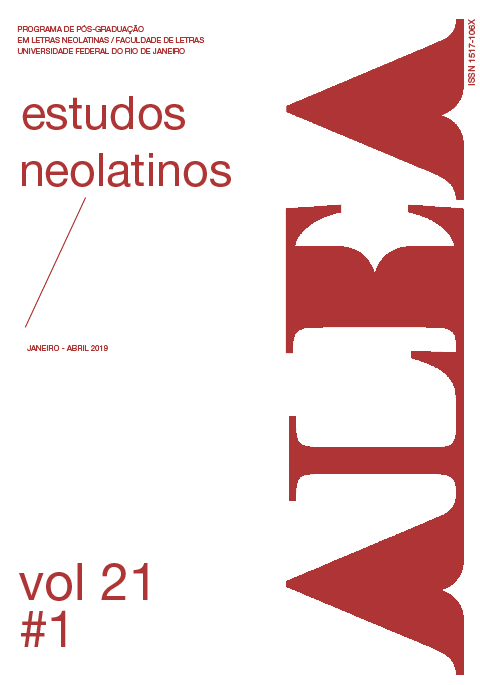Valle-Inclán e a invenção de si
DOI:
https://doi.org/10.1590/1517-106X/211209228Abstract
Tentar diferenciar as histórias inventadas das histórias reais sobre a vida do escritor espanhol Ramón del Valle-Inclán (1866-1936) não é tarefa fácil. De fato, o próprio escritor colaborou de maneira ativa e intencional no processo de fabulação sobre sua vida pessoal. O objetivo deste estudo é analisar as biografias sobre Valle-Inclán, verificando como o autor, conscientemente, se movimentava entre as categorias biografia, autobiografia e autoficção. Tomando como referência o posicionamento de Valle-Inclán sobre o evento histórico do Carlismo, na vida pessoal e na ficção e com base nas ideias de Alberca (2007), Arfuch (2010) e Lejeune (2014), concluímos que Valle-Inclán criou uma narrativa ficcional para sua vida pessoal, atuando como um personagem conservador, histriônico, extravagante. A estética do esperpento, de sua própria autoria, contribui no processo de criação ficcional de si.
References
ALBERCA, M. El pacto ambiguo. De la novela autobiográfica a la autoficción. Madrid: Editorial Biblioteca Nueva, 2007.
ALBERCA, M. La espada y la palabra. Vida de Valle-Inclán. Barcelona: Tusquets Editores, 2015.
ALBERCA, M.; GONZÁLEZ, C. Valle-Inclán. La fiebre del estilo. Madrid: Espasa Calpe, 2002.
ARFUCH, L. O espaço biográfico: dilemas da subjetividade contemporânea. Tradução de Paloma Vidal. Rio de Janeiro: EdUERJ, 2010.
CARINO, J. A biografia e sua instrumentalidade educativa. Educação & Sociedade, ano XX, n. 67, 1999. Disponível em http://www.scielo.br/pdf/es/v20n67/v20n67a05.pdf. Acesso em: 24 jan. 2017.
EFE. Nieto de Valle-Inclán: “Era muy reservado, apenas decía lo que sentía”. El Confidencial. Disponível em: http://www.elconfidencial.com/ultima-hora-en-vivo/2015-11-21/nieto-de-valle-inclan-era-muy-reservado-apenas-decia-lo-que-sentia_750947/. Acesso em: 10 mai. 2017.
LEJEUNE, P. O pacto autobiográfico: de Rousseau à Internet. 2a. ed. Belo Horizonte: Editora UFMG, 2014.
MARTÍNEZ SÁURA, S. Espira, Lorca, Unamuno y Valle-Inclán en la poética de su tempo. 1a. ed. Madrid: Ediciones Libertarias, 1998.
PASTORIZA, F. R. Ramón del Valle-Inclán: Genial, antiguo y moderno. Periodistas en español.com. 2015. Disponível em: http://periodistas-es.com/ramon-del-valle-inclan-genial-antiguo-y-moderno-59120. Acesso em: 20 fev. 2017.
VALLE-INCLÁN, J. del. (ed.). Entrevistas. Alianza Editorial: Madrid, 2000.
VILLENA, L. A. de. Ramón del Valle-Inclán. Genial, antiguo y moderno. El cultural. 2015. Disponível em: http://www.elcultural.com/revista/letras/Ramon-del-Valle-Inclan-Genial-antiguo-y-moderno/37160. Acesso em: 14 mai. 2017.
Downloads
Published
Issue
Section
License
THE AUTHOR/S confirm/s his, her or their participation in all stages of work preparation: 1) Conception, project, bibliographical research, analysis and interpretation of data; 2) Writing and reviewing the manuscript; 3) Approval of the final version of the manuscript for publication; 4) Responsibility for all aspects of the work and guarantee for the accuracy and integrity of any part of the work. The submission of works implies the immediate cession, without onus, by all authors, of publication rights to the journal Alea, licensed under CC BY (https://creativecommons.org/licenses/by/4.0/). The authors are fully responsible for the content of the article and continue to hold all copyrights for subsequent publications of it, and should, if possible, include the reference to the first publication in the journal. Alea does not commit to returning received contributions. Authors of articles, reviews or translations will receive a copy of the journal.

